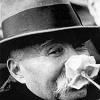- 05 Dec 2008 03:32
#1715239
Interesting. I knew they employed a scorched Earth policy, but I had never heard of this before. What a tragedy it would have been had all those bombs been detonated.
MOSCOW (AFP) - Secret plans to blow up the Bolshoi Theatre and other Moscow landmarks if the Nazis occupied the city in 1941 went on display this week in an eye-opening exhibit on Soviet military counter-intelligence.
ADVERTISEMENT
Hitler's jacket, a gun hidden inside a cane and Stalin's order that founded SMERSH -- a wartime counter-intelligence service that appeared in the James Bond films -- are also featured at Moscow's Central Armed Forces Museum.
Elderly veterans decked out in medals and officers of the FSB, the successor to the Soviet KGB, were on hand at Thursday's opening of "90 Years of Military Counter-Intelligence."
The exhibit's highlights included once-secret documents on the "Moscow Plan" from 1941, when German forces came within 30 kilometres (19 miles) of the Soviet capital.
"There was a genuine risk that German forces could have taken Moscow. So in the autumn of 1941, the so-called Moscow Plan was developed," said Vasily Khristoforov, chief archivist at FSB headquarters in Moscow.
Hundreds of agents were told to stay behind in Moscow with orders to attack German officers and destroy key buildings and infrastructure sites to prevent them from falling into Nazi hands.
More than 1,100 targets in and around Moscow were rigged with explosives, said Khistoforov. "Thank God the Germans never took Moscow and it was not necessary to blow up the sites," he added.
The Bolshoi Theatre and the iconic St. Basil's Cathedral on Red Square were among the buildings to be blown up, according to a document at the exhibit.
Another document, from October 1941, orders a group called Detachment 3R to stay in occupied Moscow and "carry out terrorist attacks against high-ranking German commanders, occupying authorities and traitors to the motherland."
The plan reflected the panic that gripped Soviet leaders as the invading forces approached, and little was known about it until the 1990s.
More triumphant memories are also featured in the exhibit, which includes a military jacket worn by Hitler that Soviet forces took from his bunker after capturing Berlin in 1945.
A veteran of that operation, 90-year-old Leonid Ivanov, recalled on Thursday how he received a note from a fellow officer that said: "Send a car. We have found Goebbels' body," referring to the Nazi propaganda minister.
But Ivanov, a retired KGB general, was tight-lipped when a journalist asked him what happened to Hitler's body.
He said that Soviet forces had burned it and sprinkled the ashes in an undisclosed location, then added mysteriously: "The location is known to me. I have been there."
The exhibit marked the 90th anniversary of the founding of Soviet military counter-intelligence in 1918 and showed some early items, such as a French-made gun hidden in a cane used by tsarist agents before the Bolshevik Revolution.
"All the European secret services used them," said Sergei Kozhin, a curator of the exhibit.
Little of the exhibit was devoted to the Cold War, although Ivanov recalled how Soviet spies began to confront their US and British counterparts while the countries were still allies against Nazi Germany.
"When we entered Germany the task was to find high-ranking Nazis and former Wehrmacht officers, but we were already switching over to work against the English and the Americans," he said.
"They began to recruit our soldiers. So we had to reorient ourselves against the British, the Americans, the French."
Ivanov and others touted the success of the Soviet Union's wartime military counter-intelligence service, SMERSH, which derives its name from the Russian words for "Death to Spies."
"Even our enemies, the heads of German intelligence, say that Soviet counter-intelligence outplayed them," said Khristoforov, the FSB archivist.
"Almost all the agents they sent were either uncovered or worked under our control. Only a handful escaped SMERSH."
Created in 1943, SMERSH only lasted three years until it was absorbed into other agencies, but it lived on in fiction as the nemesis of British superspy James Bond in Ian Fleming's novels.
In most of the Bond films however it was renamed SPECTRE, an international criminal group with an agenda of making money rather than promoting Communism.
Asked about the fictional SMERSH, Khristoforov was dismissive.
"This is pop culture material that has practically nothing in common with reality," he said.
Source
Interesting. I knew they employed a scorched Earth policy, but I had never heard of this before. What a tragedy it would have been had all those bombs been detonated.



















 - By wat0n
- By wat0n